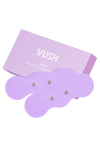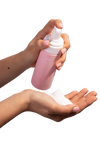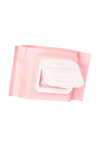
The menstrual cycle affects our mood and energy levels, but did you know that libido and sex drive can be impacted too? Your desire for sex will fluctuate throughout the menstrual cycle, which may explain why you experience high libido at some points and low libido at others. VUSH is here to unpack desire within the cycle, so you can learn more about libido and how to work with your body.
What is the menstrual cycle?
On top of your period, there are three other phases within the monthly reproductive cycle. Each of the four stages affect the body in different ways — how you feel may differ from week to week because of this.
The menstrual cycle starts with your period, which we’re all familiar with. This is followed by the follicular phase, when egg follicles develop in preparation for fertilisation. After this, the body ovulates and tries to get us pregnant. Then we go into the luteal phase which preps the body for your period again. To learn more about this in detail, read our blog on the four stages of the menstrual cycle.
What is libido?
When we talk about libido and sex drive, what we’re actually referring to is sexual desire, or the mental wanting to have sex. Libido is really just motivation for sex — what type of sex do you want and what’s your reasoning for wanting it?
We often think of libido in terms of frequency of sex — how often you want it and how often you have it. But this is all relative! What one person considers low libido may be another person’s peak libido. Low or high libido sometimes becomes an issue in relationships if one partner feels that they’re not having enough sex but the other partner just doesn’t seem to want it as much as them.
Learning about how the menstrual cycle affects desire can help couples navigate their mismatched libidos and work in sync with the cycle and each other to improve their sex life.
Why do I feel a low libido during my period?
1. It’s your inner winter
It can help to think of the menstrual cycle in seasons — your period represents winter. It’s the gloomy season that makes you wanna curl up in bed and forfeit all social interaction (but we’re sure you’ve figured that part out already just by nature of having a monthly period). People often feel pain and fatigue during their period, which are not exactly aphrodisiacs.
2. Low hormone levels
Your hormone levels are low during your period compared to other stages of the cycle. The main hormones involved in the menstrual cycle are oestrogen, progesterone, luteinizing hormone (LH), and follicle-stimulating hormone (FSH) — all four of these are relatively low at the start of your cycle when you're on your period.
3. Your body isn’t ready to get pregnant
Your period means your body is shedding its uterine lining and starting to go through your entire menstrual cycle all over again. It’s not the right time in the cycle to start a pregnancy. You’re less horny because your body isn’t necessarily looking to get pregnant right now!
4. Sex can feel different on your period
When you’re on your period, the cervix is likely to be lower than usual which can make deep penetration slightly more difficult (however, when the body is aroused, the uterus should move upwards to lengthen the vagina to make this easier). The good news is, menstrual blood can act as natural lubrication, which can make penetrative sex more enjoyable!
Why do I feel an increased libido after my period?
1. Your cycle is about to peak
After your period, your body goes into the follicular phase, which prepares your body for ovulation, the peak of the cycle when it comes to libido and energy. Estrogen and testosterone begin to rise, which can explain the increased sexual desire. About 2 weeks after your period is when you should feel the highest libido, when LH and FSH peak.
2. Mood booster
You know what happens after winter — spring!The end of menstruationis often accompanied by increased mood, which can lead to higher libido. Spring is about refinding your lust for life, socialising, creating, and flourishing. You may feel more confident and flirty during the follicular phase. This translates into a higher libido and increased curiosity for exploration in your sex life.
Don’t forget lube!
Despite the increased libido during this time, the vagina may feel more dry than usual right after your period. This is because little to no cervical mucus is produced during this time. Not to worry, all you’ll need is a little extra lube. We recommend using lube each time you’re having sex, but it’s especially important during the start of the follicular phase. Natural lubrication will pick up towards the end of the follicular phase as you head into ovulation.
Why do I feel an increased libido before my period?
1. High libido during ovulation
About 2 weeks before your period is when you ovulate. The ovulatory phase is the most fertile time within the cycle, which often leads to increased libido.Your body wants to get pregnant (even if your lifestyle and bank account don’t). If you’re trying for a baby, now is your time.Ovulation isyour body’s summer, so it’s the perfect opportunity to go on fun dates and have lots of sex. Just remember to double check your contraceptive methods while you’re ovulating if you’re aiming not to get pregnant.
2. Decreasing libido during luteal phase
Right before your period is the luteal phase. Your body will most likely start to lose energy and sex drive in the few days leading up to your period as progesterone and estrogen levels drop off. Typical hormone activity would explain a decrease in libido right before your period, so if this is your horniest time, there might be another explanation. Maybe you know that your impending period means there’s a reduced risk of pregnancy and that turns you on?
3. Alleviation of PMS symptoms
Some people like having sex right before their period to reduce some of those awful PMS symptoms. Did you know orgasms release endorphins which can alleviate cramps and aches? Orgasms also boost your serotonin which makes you feel happier (a welcome feeling when you’re PMSing), alongside stimulating blood flow to the brain which can improve mental clarity and productivity.
What else could affect my libido during my cycle?
Your period is not the only thing that could be affecting your libido. Sexual desire fluctuates as a response to a number of factors, including (but not limited to):
Stress
From an evolutionary perspective, when you are stressed, your body is not a safe place to create life and therefore it doesn’t want you to get turned on. If there is stress in your immediate environment, sex is going to be the last thing on your mind.
Additionally, if you’re not feeling safe or happy in your relationship, it’s unlikely that you’ll want to have sex with that person. Remember, libido is not only about physiology and anatomy— there are also mental and social factors at play
Exercise
Exercise produces endorphins which make you feel good. If your libido is high and you’re wanting sex, it’s probably because you’re feeling good! Next time you feel that post-workout glow, channel that energy to get the fire going with a partner.
Medication
Medications such as antidepressants can sometimes correlate with a change in desire. They can also impact sexual functioning such as ease of orgasms, the vagina’s ability to naturally lubricate, or the penis’ ability to sustain erections. If you’re worried about low libido or sexual functioning as a side effect of your medication, talk to your doctor.
Contraception
The peaks and troughs of sexual desire we mentioned earlier are mostly relevant for those who have a standard menstrual cycle that is not impacted by hormonal birth control. Contraception methods like the Oral Contraceptive Pill or the Mirena IUD can cause fluctuations in libido and changes to the menstrual cycle’s regular hormonal activity.
Pregnancy
It’s no secret that pregnancy has a huge effect on the body.Your hormones do completely different things when you’re pregnant compared to when you’re not.Sex drive during pregnancy will be different for everyone— some people feel sexier than ever while others feel like the pain is too much to even think about sex.
Sleep
Sleep and overall health can impact your sexual desire. If your body is not feeling rested and healthy, it will focus on improving your health rather than making a baby. Poor sleep habits and insomnia have been linked to sexual dysfunction such as reduced arousal and erectile dysfunction.
Another thing to consider is when you normally try to have sex — is it right after you get into bed when all you want to do is go to sleep? If you’re tired, you’re not going to have the energy to get hot and steamy.
Travel
Travel has a big impact on the body and can often either cause or reduce stress. Sex may not feel like a priority when you’re dealing with a huge time difference or trying to do the maths to convert foreign currency to AUD. On the other hand, if your travel is the relaxing, sit on the beach with a book and a cocktail kind of travel, then your libido is likely to increase due to reduced stress, more free time, and that ultimate sense of holiday bliss.
Read more on VUSH Wellness:
For more information on menstruation, read our beginner’s guide to surviving your period or our article on the potential causes of period pain.
To learn about chronic illnesses related to reproductive health, read our blog on endometriosis.
Check out our blog on TENS machines to learn about our VUSH Wellness essential, our pain relief device.









 AUD $
AUD $
Leave a comment (all fields required)